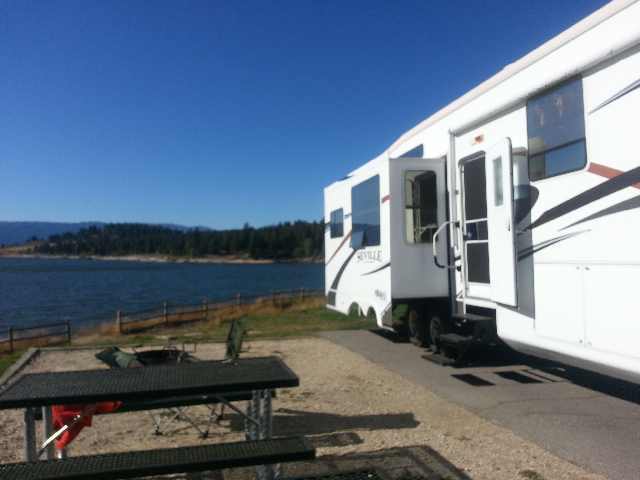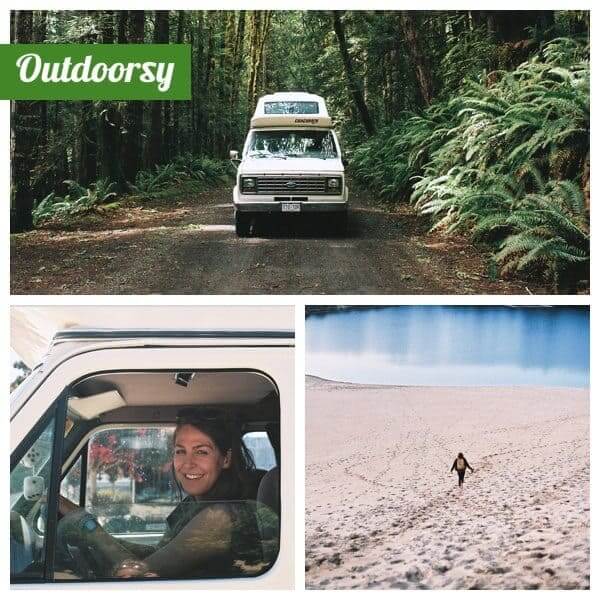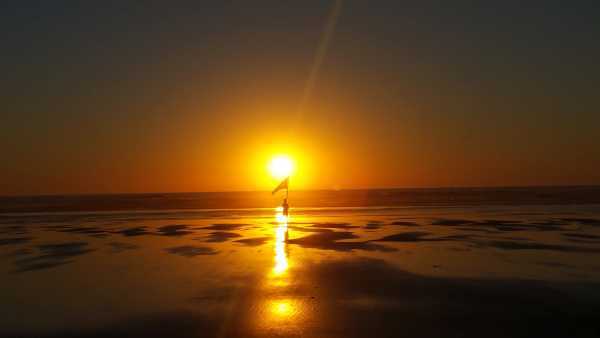We all like to own stuff, right? But – when does it make sense to own an RV vs. renting one? The answer is “it depends” – read on to see what makes the most sense for you…
Allow me to open this provocative topic by offering these thoughts – I’m a full-time traveler living in a 5th wheel that I own. I’m happy to be an owner of a (great) 5th wheel. I also know I’m getting lots of use out of it 365 days each year. Further, as a full-timer, ownership is my only viable option.
I also serve as a RV Consultant – and have for years. I’ve worked with many folks who want an RV to make memories, travel with the kids, travel in retirement, etc. As I helped each party find their ideal camper, I sometimes wonder is owning an RV the answer – or are you better off renting and leaving all the related costs and responsibilities to someone else?
As a comparison… I’m a life long skier. I can recall flying out west and dragging the skis along. Today, as a ski instructor at Jackson Hole Mountain Resort, the majority – the VAST majority of the skiers I see who travel to the mountain do NOT own their own skis. They rent – and for most, it makes sense for their needs. They can fly to their destination, obtain their “tool” (skis), use them for the week when its needed and then return them. They’re not responsible for the maintenance required by owners of skis, nor are they subject to the rapid depreciation of the skis as experienced by owners.
RV’s – campers, motorhomes, travel trailers, and fifth wheels may make sense to RENT and not to OWN. Let us look at the relative merits of each option – renting vs. ownership –
The Reality of Owning a RV Camper (towable OR motorhome)
First the advantages – you own it, it’s all yours, the bed, the fridge, and all the storage spaces where you can place all your “stuff” so when you want to go camping, much of the work is already done. You have your dishes, cups, silverware, chairs, bedding and all stored in your RV camper and when you want to go… with minimal preparation, you go!
BUT… you also own a DEPRECIATING ASSET. If you buy a new camper, expect its value to decline by 40% in the first 2 years (on average – and this is particularly true for towables.) If you buy used, the term “buyer beware” is truly applicable!
Incidentally… This is why I started my Concierge Buying (and Selling) Service for RV’ers (all types of RV’s.) Through my service, I’ve had clients buy the best camper at the right price – and in the process avoid over-spending and avoid the heartache of buying the all-too-common poorly made RV.
Even with my buying service, the camper you buy will likely be worth more the day you purchase it than at any time in the future. So, while your camper sits on the side of your home OR in paid storage, it is likely continually depreciating.
Further, just as with other expensive “toys”, it can be a money pit. You’ll need to have insurance and want to have an extended service contract- so more money is going OUT instead of working for you. Even while in storage (which is often an additional expense), components “age” and its not uncommon for repairs to be needed on your refrigerator, furnace, landing gear and more. Much of which is covered (mostly) by extended service contracts, but only in part. You’ll still have to shell out some hard earned cash.
Here’s a BIG advantage to RV Ownership… You make your RV Camper work FOR you while it’s not in use.
This is ONE bright spot to the above scenario if you’re the “typical camper” who has their RV in storage for much of the year and only uses it a few times during the spring and summer… thanks to a company called Outdoorsy, they are like an “air bnb” for the rv world.

I started looking into Outdoorsy as a matter of intellectual interest. They provide a path for RV owners to earn income on their campers when they would otherwise simply be sitting unused; they also provide a great gateway for folks to rent an RV that meets their needs. With the fees they collect for their service, they PROTECT THE RV OWNER against any damage caused by renters and the RENTER is protected in the event of trouble while on the road. Of course, the end user (owner or renter) has to read the contract to understand how Outdoorsy does this. So… as an RV owner, you can rent out and put your camper to work FOR you. Again, yes they take a service fee with every rental, but part of that fee is used to PROTECT you from renters damaging your camper – and to make you “whole” if something happens. (Feel free to contact me for more details on their policies – Outdoorsy has briefed me on how they do this.)
If you already own a RV and want to put it to work FOR you – click the image below to learn more about their program…
Does Renting -instead of buying an RV Camper Ever Make Sense?
If you’re considering RENTING rather than OWNING an RV – here’s some food for thought…
Through Outdoorsy, typical rental fees are $90 – 150 per day. Since Outdoorsy operates like an “air bnb”, you’re actually renting from individual owners who own all types of rv’s (motorhomes, towables, etc.) and are located all over the nation.
For my readers, I have negotiated a special deal on your first rental. Click the image below to learn more and see RV’s available in the region of your choice…

Consider for example, you live in Northern New Jersey, but you want to vacation and explore the National Parks in Wyoming and Utah – through Outdoorsy, you can locate a camper for rent in that region and you can fly there to pick up “your” rv for your rental period.
In addition to saving the transportation costs associated with driving a camper across the nation, you only pay for the rental and are not burdened by any of the expenses detailed above associated with ownership.
Rent or Own an RV – Which makes more sense for you?
With a rental, of course you don’t have your own bed, plates, chairs to store in the camper for when you do use it – but as noted earlier, you don’t have the costs, expenses, and depreciation.
As a full-time traveler myself, the choice is obvious – I have to own my own camper. But, after years in the industry, I discovered that many RV owners stored their camper for the better part of 7 months out of a calendar year, leaving only about 5 months for active use.
Out of the 5 months (at best) most owners use their campers a few weekends, or perhaps for a week or two. The bean-counter in me HAS to wonder – with this pattern of usage, is it worth owning something that will EASILY depreciate hundreds (or thousands) of dollars from year to year, cost you hundreds in insurance, perhaps hundreds (or thousands) in service contracts and/or repairs and in routine maintenance.
A Cost Analysis…
What does it REALLY cost to OWN an RV?
When you own an RV, insurance will run (for part-time use) from $300 to $1000 per year (motorhomes are at the high end of that range.) Extended service contracts typically cost $300 to $700 per year (based upon a 6-7 year contract, paid primarily upfront, and assuming a good discount on the policy; the high end of this range again applies to motorhomes.)
Depreciation can vary widely from case to case as will interest paid on loans. In my time as an RV consultant, I have seen many folks take on big time debt ($50,000+) at a 6% interest rate (remember – rv’s are recreational loans) for terms of 10 -15 years (or longer.)
Let us assume you purchased a $50,000. trailer new (that’s the price you paid). Based upon that purchase price, your first year’s depreciation is $10,000., as is your 2nd years; after then you will see its value decline about $3000. – 5000. per year for the next few years. If you buy used, the numbers are not as grim, but there will still be a depreciation to consider. Finally, routine maintenance includes winterizing your camper ($50-100. typically), repacking the bearings (and alignment), approx. $450., engine tune-ups (for a motorhome) $200-400. and roof/slide maintenance $200 (unless you do the work yourself.)
Further, if you took a loan out on it, based upon 10% down, you’re borrowing 45,000. for 15 years, your first years’ interest payments are about $4500. Over time, this figure will decrease as all loans are “front loaded” where interest is paid before principle.
Summarizing…
In the first year, your new $50,000. camper (trailer) has cost you:
$10,000. depreciation (again, assuming its a new camper)
$300. insurance
$300. extended service contract
$450. storage fees
$4500. interest payments
So – without any costs of accessories or repairs or maintenance figured in, you’re over $15,000. If you purchased a used camper, you could drop that significantly, perhaps to as little as $5000. as depreciation will be less but maintenance and repairs will be significant.
Wrapping it all up, as you can see, owning an RV is an expense (and responsibility) you need to be prepared for. Depending upon how you use it and how much you use it – it may make perfect sense – or – renting may be a more viable option. Read on for details involving the cost of rv rentals
What does it cost to RENT an RV Camper?
In contrast, when you rent, you take the camper of your choice for a prescribed period of time, pay your fee, have your fun and then return it back to the owner who has all the other responsibilities that YOU get to WALK AWAY from.
To examine costs, if you rented for 4 one week periods of time, you’ll pay about $1000. per week (figuring just under $150/day.) At the end of each rental, return it and then you wash your hands of it. So, by the end of the summer season, you’ve spent $4000. renting a trailer, exploring the terrain you intend to and then you return the trailer to its owner.
Closing thoughts on renting…
As you can see, depending upon how often you go camping in a RV, renting may make sense. Further, if you’re thinking of becoming an RV’er, you may wish to RENT before you BUY. I have personally talked with Outdoorsy and believe they are offering a valuable and convenient service that is worthy of your consideration.
Regardless of whether you’re an RV owner who wants to put your camper to work for you while it would otherwise be sitting or if you’re looking to make new memories through RV travel but don’t want the expenses and responsibilities detailed earlier in this article, renting is a potentially great idea.
After doing some research, I believe Outdoorsy has established itself as an honest broker for both owners and renters. And hey… if you start RV’ing by renting and decide you like the lifestyle – like I did and still do – you’ll progress to being a full-time traveler and a proud owner of a depreciating asset that acts like a money pit much of the time! (Just kidding – or am I??!!)
In closing, if you think RENTING an RV may be a viable option for you, click HERE to see RV’s available in your region of interest and the cost to rent each (and remember – as a reader of RV Across America, you’ve earned a special deal on your first rental!)

I loved what you said about making your RV work for you. My husband and I own an RV, but we can’t drive it. It’d be nice to hire a transport service for it.
Thanks for your feedback Eve, my thoughts come from years of living in these things AND 4 years (summers) on the sales lot to help folks get the right camper. I continue to serve folks via my Concierge RV Buying Service.
hello,
what is a realistic amount to expect to make if you rent out your travel trailer? I understand like $100 a day, but how many rentals can the average person actually expect to get over the course of a year? For context i live in Ohio.
Kevin,
I suggest you direct your question to Outdoorsy directly. I don’t have any data to offer a realistic estimate. I would also think there are many variables not the least of which is the virus, restrictions to attractions/campgrounds people would normally travel to/camp at, and the type of camper, location, etc.
Al